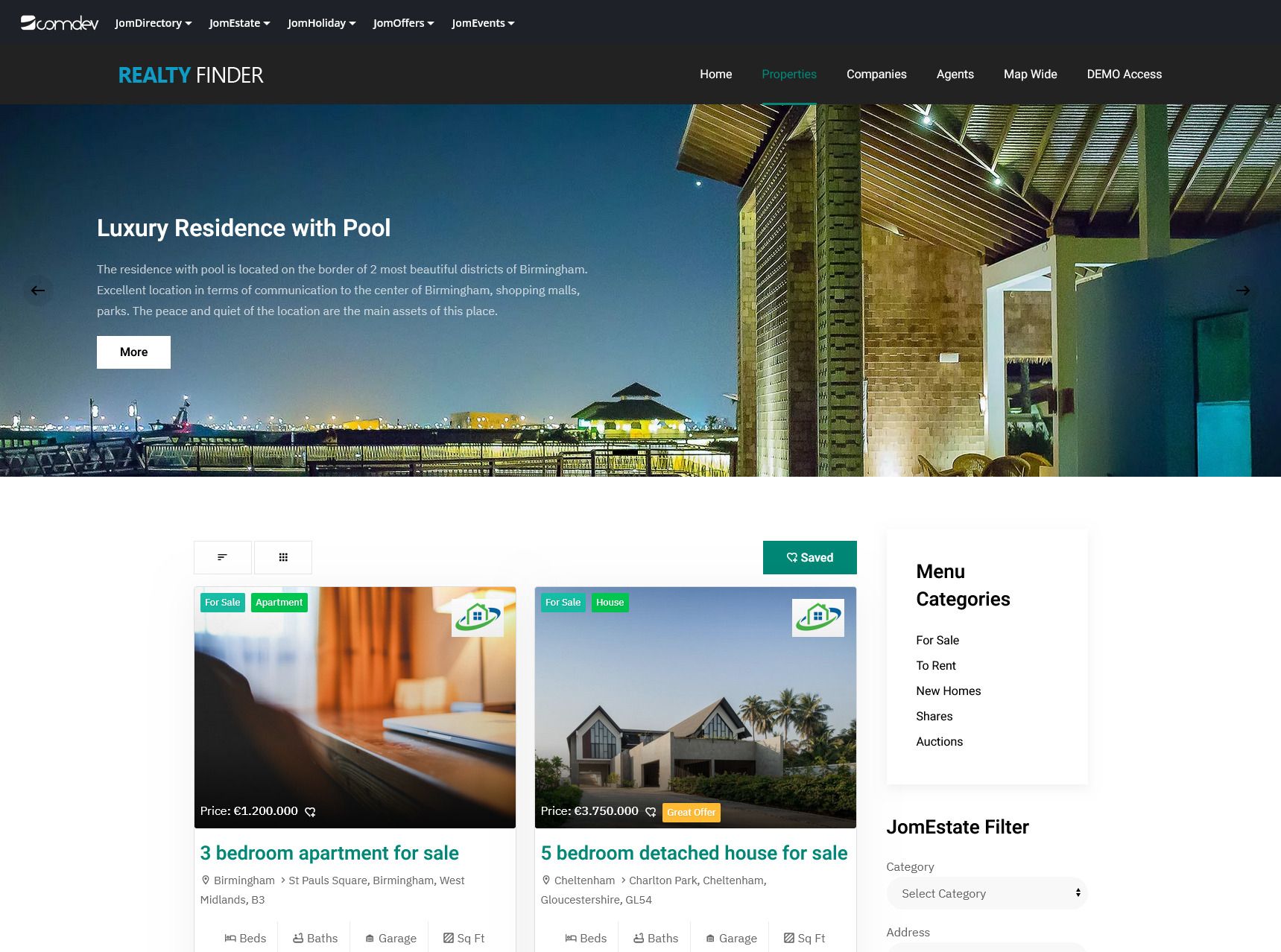How to Build a Real Estate Website: A Complete Guide

Building a real estate website using Joomla, particularly with the JomEstate extension, provides a comprehensive solution for realtors, agencies, and property managers. This guide will walk you through the process of creating a professional and functional real estate website using Joomla and JomEstate, focusing on key features that can help you attract potential clients and streamline property management.
Define Your Website’s Objectives
Start by defining what you want to achieve with your real estate website. Whether it’s generating leads, showcasing properties, or providing detailed real estate information, having clear goals will guide your site’s design and functionality.
Select a Domain Name and Hosting
Choose a domain name that reflects your brand and is easy to remember. Including keywords related to real estate can also help with search engine optimization (SEO). After securing your domain, select a reliable hosting provider that offers good uptime, fast loading speeds, and robust customer support.
Install Joomla and JomEstate
Begin by installing Joomla, a powerful content management system (CMS) known for its flexibility and extensive range of extensions. After Joomla is set up, install the JomEstate extension, which is specifically designed for real estate websites. JomEstate provides a rich set of features, including property listings, advanced search filters, and a user-friendly backend for managing content.
Choose a Real Estate Template
Select a Joomla template tailored for real estate websites. A good template will be responsive, ensuring that your site looks great on all devices, and it should support the features of the JomEstate extension. Templates like “Estate” and “Realty” are popular choices, offering pre-designed layouts and customization options.
Configure JomEstate and Essential Extensions
JomEstate Configuration:
- Property Listings: Create and manage property listings, complete with photos, descriptions, prices, and detailed specifications. JomEstate supports various property types, making it easy to list residential, commercial, or rental properties.
- Advanced Search: Implement advanced search functionality to help users find properties based on specific criteria such as location, price range, property type, and more.
Essential Extensions:
- SEO Optimization: Use Joomla SEO extensions like sh404SEF or Easy Frontend SEO (EFSEO) to optimize your site for search engines.
- Contact Forms: Install extensions like RSForm! Pro to create contact forms, allowing potential clients to easily get in touch.
- Security: Secure your website with tools like Akeeba Admin Tools to protect against common threats.
Create Essential Pages
Your real estate website should include several key pages to provide comprehensive information to visitors:
- Homepage: Introduce your business, highlight featured properties, and include a search bar for quick navigation.
- Property Listings: This page, powered by JomEstate, should display detailed property listings, complete with high-quality images, descriptions, and contact information.
- About Us: Share your business’s story, mission, and team members to build trust with visitors.
- Contact Us: Provide clear contact information and a contact form to facilitate inquiries.
- Blog: Publish articles on real estate trends, market insights, and tips for buyers and sellers to engage visitors and improve SEO.
Optimize for SEO
SEO is crucial for increasing your website’s visibility in search engine results. Ensure that your content includes relevant keywords, optimize meta descriptions and titles, and use alt texts for images. Additionally, implement internal linking and ensure your site is mobile-friendly.
Integrate High-Quality Content
Content is key to engaging visitors. Use high-resolution images for property listings and provide detailed, informative descriptions. Consider adding virtual tours or video walkthroughs to give potential buyers a better sense of the properties.
Connect Social Media
Integrate your social media profiles with your website to expand your reach. Add social sharing buttons to property pages and blog posts, and regularly share content on platforms like Facebook, Instagram, and Twitter to attract more visitors.
Test and Launch Your Site
Before launching your website, thoroughly test all features, including property searches, forms, and payment gateways if applicable. Check for broken links and ensure the site is fully functional. Once everything is set, launch your site and begin marketing it to your target audience.
Conclusion
Using Joomla and the JomEstate extension, you can create a powerful and professional real estate website that meets all your business needs. This setup not only helps in showcasing properties but also in managing client relationships and generating leads. By following these steps, you’ll be well on your way to establishing a strong online presence in the real estate market.
Implement these strategies to ensure your real estate website stands out and attracts a broad audience.